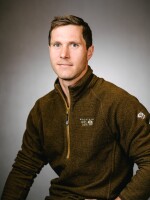On a recent Tuesday morning at the West Jordan library outside Salt Lake City, Peter Sadler was carefully stabbing an orange with a syringe.
"Try to be as calm and collected as you can. Then gently, just place the needle in the orange and then inject the fluid," Sadler explained to several onlookers.
Sadler works with Utah Naloxone, a nonprofit that teaches people how to use the fast-acting overdose reversal drug. He was there teaching librarians from around Salt Lake County.
Trainings like this are increasingly common. The nonprofit holds them at universities, addiction recovery centers and hospitals. But this day marked a new development.
That's because Salt Lake County is likely the first library system in the country to stock and distribute naloxone kits. Utah Naloxone and Intermountain Healthcare donated 400 kits which are now at 18 library branches. A little over 50 kits have been picked up to date, staff said.
Neither the American Library Association or the Urban Libraries Council could provide names of other libraries with naloxone distribution programs.
"Libraries are strategically placed around the county. It's a very comfortable environment for people to seek access for this," Sadler said.
It's a new role for librarians, one that's being promoted by public health and drug enforcement officials but met with caution by some researchers. The idea came from a past overdose training between librarians and Utah Naloxone.

Crista Warren was at the training with Sadler. She's the manager at the nearby Riverton library.
"We have tax forms, we have e-books, we have books and audio things, we have great things to entertain our kids and programs, but this is something that can help someone save their lives," Warren said.
According to the Centers for Disease Control and Prevention (CDC), around 115 people die from an opioid overdose every day in the U.S.
Naloxone, also known commercially as Narcan, has been around since the 1970s . It used to be a prescription-only drug, but as the nation grapples with the devastating opioid epidemic many states have adopted laws to make it more accessible. And it's not only the public health community that's endorsing it.
"It's literally just a miracle drug," said Brian Besser, the Drug Enforcement Administration's top agent in Utah.
"From a public safety perspective, especially from a DEA perspective, we want to see Narcan and naloxone get into the hands of as many people as possible, whether it's private homes, educational institutions, faith-based institutions." Besser said. "We want to see that because if it saves lives, it saves lives. It's just that simple."
There's no doubt that naloxone saves lives. But Anita Mukherjee, an economist at the University of Wisconsin worries that increasing access to the drug could create a false safety net.

"There's no area in the U.S. where we see a statistically significant reduction in mortality because of naloxone access," Mukherjee said.
Mukherjee recently co-authored a paper on what she calls the 'unintended consequences' of increased access to naloxone.
Her state-by-state analysis showed no reduction in overdose deaths. In fact, according to her research, in the Midwest a 14 percent increase in opioid overdoses corresponded with increased access. Mukherjee worries that increase naloxone access to the drug could be changing how people act.
"People might take more risks because you've basically now reduced the risk of death from overdose," Mukherjee said.
She emphasized naloxone is an important life-saving drug. But she cautions that the overall effects on death rates are negligible if people don't get treatment for their addiction.
Mukherjee's research has gotten considerable ushback from the public health community.
Jennifer Plumb, a pediatrician and the co-founder of Utah Naloxone, said she disagrees with Mukherjee's conclusions and with the quality of the study.
"You better have a pretty rigorous methodology and pretty good measures put into place if you're going to start making judgements like 'Boy this is either a net zero or possibly even making it worse,'" she said.
Plumb questioned the researchers' use of Google search data to assess increased interest and awareness of naloxone. She said they also hadn't taken into account other changes, like states having not expanded Medicaid, which would lead to fewer treatment providers.
Plumb stressed the importance of naloxone access programs at preventing overdose deaths. Sometimes this involves the same drug user getting the overdose reversal drug multiple times. And she says with a disease as complex as opioid addiction that's important if they're ever going to get into recovery.
"Nothing is perfect in this realm, and of course naloxone isn't perfect either," she said. "Except if you can get it to somebody in time, it's perfect at making sure somebody's not dead."
Correction (7/30/18): a previous version of this story misspelled the name the name Christa Warren as Chrystal Ward.





